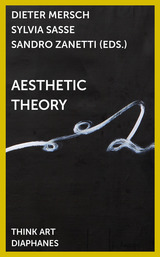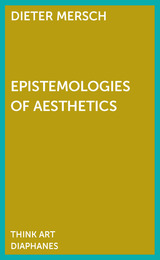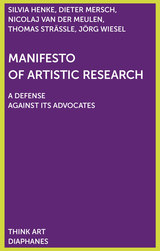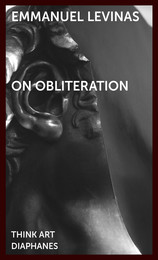4 books about Mersch, Dieter

Aesthetic Theory
Edited by Dieter Mersch, Sandro Zanetti, and Sylvia Sasse
Diaphanes, 2019
Theodor Adorno’s famous aesthetic theory was not merely a theory of the aesthetic; it also made a wider claim about the aesthetic implications of all theory. At the same time we have to deal with aesthetic objects and events in which an aesthetic theory is inherent, which show themselves as art. From both sides—theory and aesthetics—a link can be made to the etymological meaning of theōria, which understands the theoretical as a seeing or perspective. Featuring lucid essays by major thinkers, the book examines this link, focusing equally on the aesthetic implications of theory and the theoretical implications of aesthetic events.
[more]

Epistemologies of Aesthetics
Dieter Mersch
Diaphanes, 2015
The ideas of “art as research” and ”research as art” have risen over the past two decades as important critical focuses for the philosophy of media, aesthetics, and art. Of particular interest is how the methodologies of art and science might be merged to create a better conceptual understanding of art-based research.
In Epistemologies of Aesthetics, Dieter Mersch deconstructs and displaces the terminology that typically accompanies the question of the relationship between art and scientific truth. Identifying artistic practices as modes of thought that do not make use of language in a way that can easily be translated into scientific discourse, Mersch advocate for an aesthetic mode of thought beyond the “linguistic turn,” a way of thinking that cannot be substituted by any other disciplinary system. A sophisticated reflection on the epistemological status of the aesthetic by one of Germany’s leading philosophers, Epistemologies of Aesthetics will be of great interest within this growing field of study.
In Epistemologies of Aesthetics, Dieter Mersch deconstructs and displaces the terminology that typically accompanies the question of the relationship between art and scientific truth. Identifying artistic practices as modes of thought that do not make use of language in a way that can easily be translated into scientific discourse, Mersch advocate for an aesthetic mode of thought beyond the “linguistic turn,” a way of thinking that cannot be substituted by any other disciplinary system. A sophisticated reflection on the epistemological status of the aesthetic by one of Germany’s leading philosophers, Epistemologies of Aesthetics will be of great interest within this growing field of study.
[more]

Manifesto of Artistic Research
Silvia Henke, Dieter Mersch, Nicolaj van der Meulen, Thomas Strässle, and Jörg Wiesel
Diaphanes, 2020
Since its beginnings in the 1990s, artistic research has become established as a new format in the areas of educational and institutional policy, aesthetics, and art theory. It has now diffused into almost all artistic fields, from installation to experimental formats to contemporary music, literature, dance, or performance art. But from its beginnings—under labels like “art and science” or “scienceart” or “artscience” that mention both disciplines in one breath—it has been in competition with academic research, without its own concept of research having been adequately clarified. This manifesto attempts to resolve the problem and to defend the term. Further, this manifesto defends the radical potential of artistic research against those who toy all too carefully with university formats, wishing to ally their work with scientific principles. Its aim is to emphasize the autonomy and particular intellectuality of artistic research, without seeking to justify its legitimacy or adopt alien standards.
[more]

On Obliteration
An Interview with Françoise Armengaud Concerning the Work of Sacha Sosno
Emmanuel Levinas
Diaphanes, 2019
Emmanuel Levinas’s interview with Françoise Armengaud in 1988 is one of the only statements we have from the philosopher, who became influential in various disciplines through his ethics that focuses on the fine arts specifically. Presented in English for the first time here, this interview brings us Levinas’s understanding of “obliteration” as an uncanny, disruptive, and even “unavailable” concept. Discussing the work of the French sculptor Sacha Sosno, Levinas parses the complex relationship between ethics and aesthetics, examining how they play out in artistic operations and practices. In doing so, he turns away from the “ease and lighthearted casualness of the beautiful” to shed light instead on the processes of material wear and tear and the traces of repair that go into the creation and maintenance of works of art, and which ultimately give them a profound uniqueness of presence. This evocative interview uncovers a hidden thread of aesthetic thinking in Levinas’s work and introduces a new way of looking at artistic practices in general.
[more]
READERS
Browse our collection.
PUBLISHERS
See BiblioVault's publisher services.
STUDENT SERVICES
Files for college accessibility offices.
UChicago Accessibility Resources
home | accessibility | search | about | contact us
BiblioVault ® 2001 - 2024
The University of Chicago Press









